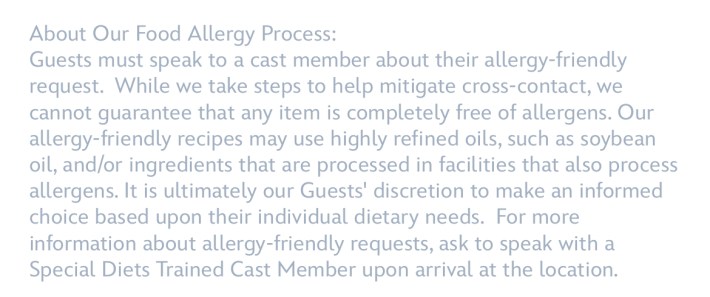The Disney company was named in a wrongful death lawsuit filed in Orange County, Fla., back in February, by the estate of a New York doctor named Kanokporn Tangsuan. Tangsuan ate a meal in October 2023 at an Irish-themed restaurant called Raglan Road, situated in Disney Springs, a commercial district in Walt Disney World. Later that evening, Tangsuan suffered a severe allergic reaction and collapsed on the floor of the Planet Hollywood in Disney Springs; Tangsuan self-administered epinephrine via an auto-injector and was rushed by ambulance to a local hospital, where she died of anaphylaxis. Tangsuan's estate, represented by her widower, Jeffrey Piccolo, has accused the Disney corporation and Raglan Road's parent company of causing Tangsuan's death through negligence.
According to the complaint, Tangsuan did about as much as a person can do to ensure that the food she ordered at Raglan Road does not contain allergens, short of marching back into the kitchen and cooking it herself. First, before ordering anything from the menu, Tangsuan advised her waiter at Raglan Road that she was severely allergic to nuts and dairy. She and Piccolo made specific inquiries about certain menu items; the waiter then left the table to speak to the chef, and returned to assure Tangsuan that her order could be made without any nuts or dairy. Per the complaint, after the food arrived at the table, Tangsuan checked again to make sure that it was safe for her to eat:
When the waiter returned with Tangsuan's food, some of the items did not have allergen free flags in them and Tangsuan and Piccolo once again questioned the waiter, who once again guaranteed the food being delivered to Tangsuan was allergen free.
Disney filed a motion in the case on May 31, and it is a masterpiece of corporate cruelty. You expect a certain amount of callous indifference to human suffering from your sprawling international conglomerates, but you do not in general expect a company fronted by a benevolent anthropomorphized mouse to say Sorry, even if we were responsible for killing someone you could not sue us, because you are a user of our streaming service. That simplifies the case laid out by Disney's lawyers in their motion to compel arbitration, but not by much: Disney also of course denies responsibility for Tangsuan's death, but mainly they argue in their motion that this is not a matter for the courts. Disney's expressed position in the motion was that Tangsuan's estate must be compelled to settle this matter via arbitration, because Piccolo, as the estate's representative, signed up for the company's Disney+ streaming service, way back in 2019. Disney insists it's right there in the Terms of Service for Disney+. Apparently the app's users waive the right to sue the company in court for, uhh, possibly anything the company does wrong, under any circumstances, anywhere on Earth, ever (emphasis mine):
Raglan Road is owned and operated by Defendant Great Irish Pubs Florida, Inc. [Disney] leases the property to Great Irish Pubs. The Complaint alleges an agency relationship between landlord and tenant. But the only facts supporting this theory are “representations” about Raglan Road’s “allergen free food” on the Walt Disney World website. Piccolo alleges that he relied on the website in choosing to dine at Raglan Road. But Piccolo ignores that he previously created a Disney account and agreed to arbitrate “all disputes” against “The Walt Disney Company or its affiliates” arising “in contract, tort, warranty, statute, regulation, or other legal or equitable basis.”
Before even getting to the incredible arbitration argument, the scare quotes on "representations" and "allergen free food" are like an entire Bennett Brauer* skit unto themselves. So you're saying I "stated explicitly" in "writing" on a "public website" that my food would "not kill you," and then you "died." Disney's motion to compel avoids delving too deeply into this vein of defense, and for pretty good reason: However much they might wish to shove responsibility for this episode onto Great Irish Pubs Florida Inc.—and however successful that effort may ever be in courts or arbitration—it will not be possible for Disney to entirely escape responsibility for this sort of thing in the dreaded court of public opinion.
Contractual apparatuses notwithstanding, as far as any Disney World guest is concerned Raglan Road is by all outward appearances a Disney operation, as are all but a tiny handful of the restaurants found on Walt Disney World property. Disney Springs is not some sweaty agglomeration of businesses suckered onto the outer perimeter of Disney World: The commercial district was built by Disney on Disney property for the use of Disney guests; it is advertised by Disney and maintained by Disney; its security is hired by Disney; every business in Disney Springs that is not directly operated by Disney has Disney for its landlord. Raglan Road has a listing on Disney World's website and on the company's My Disney Experience app, and you can use either to make direct reservations at the restaurant. The website and app also present Raglan Road's menu, at the bottom of which is some Disney company boilerplate about "our food allergy process." Note that Raglan Road employees are referred to here not as "restaurant staff" but as "cast members," which is the Disney term for, well, people who work for Disney:

This is meant to cover Disney, but it's worth noting how incompatible it is with the reality of visiting Walt Disney World, where Disney Springs is located. Disney World covers 47 square miles of central Florida, more than twice the area of Manhattan. It is enormous. There are highways in and out, of course, but the idea—and this is the very thing Disney World is selling—is once you cross under the big happy entrance gateway, you are in the care of the Walt Disney corporation. Disney is not in the business of telling people that every time they need a meal they should plan on driving right back under that gateway, in order to find a non-Disney restaurant capable of not poisoning them. It may not be as ludicrous as insisting that 150 million unwitting Disney+ users have signed away their right to sue Disney in court, but telling people that you can't be held responsible for the ingredients in the food served inside the boundaries of your private fiefdom is preposterous.
The deranged but essential Walt Disney World News Today (WDWNT) blog noted back on March 15 that the Raglan Road website, presumably managed by Great Irish Pubs Florida Inc., added a stronger allergy warning to their website, right at the top of the page featuring their menus, in the month following the filing of the wrongful death complaint:

Disney was hoping not to have to defend any of this stuff on the record, which is one of the reasons why it filed the motion to compel. Disney filed exhibits and declarations in support of its motion, attempting to establish that basically anyone who does business with Disney—whether by signing up for Disney+ or by using the My Disney Experience app or by creating an account on their website in order to make online reservations—has agreed to an arbitration clause by accepting the terms and conditions, not only on their own behalf but "for all persons (including minors) for whom you are purchasing or otherwise securing benefits and/or managing those benefits and entitlements." By this interpretation, Piccolo—who signed up for Disney+ and who purchased theme park tickets for Tangsuan (note that Disney Springs does not require tickets)—signed away not only his own right to sue Disney for whatever responsibility he insists it has for his wife's death, but Tangsuan's right to sue Disney for any responsibility it might have for her poisoning.
Even the good folks at WDWNT failed initially to notice Disney's motion to compel. Then on Aug. 2, Brian Denney, the plaintiff's attorney, filed a response (embedded below). This got a lot of attention, probably because Denney alerted some media contacts, but also because his response is righteous and scathing, describing Disney's arbitration clause as "procedurally and substantively unconscionable" and going line by line through both the motion to compel and the various terms and conditions it cites to expose the monstrosity of Disney's argument. "The notion that terms agreed to by a consumer when creating a Disney+ free trial account would forever bar that consumer’s right to a jury trial in any dispute with any Disney affiliate or subsidiary," writes Denney, "is so outrageously unreasonable and unfair as to shock the judicial conscience." Denney further points out that the arbitration clause portion of the terms and conditions accepted by Piccolo was effectively hidden from view, "contained in a link" in the Disney+ terms and "buried within another document," itself hyperlinked, in the Disney terms of use, with no warning that anything so consequential was contained therein.
The public attention this brought to Disney's motion to compel runs directly counter to the purpose of the arbitration clause, and soon the company found itself on the defensive, facing a wave of opprobrium. On Aug. 14, Disney put out a mewling, self-pitying statement saying that they "are merely defending ourselves against the plaintiff’s attorney’s attempt to include us in their lawsuit against the restaurant." This manages to avoid contending with the inconvenient fact that Disney is and has always been free to argue that it should not be included in the lawsuit, in court. There will be plenty of time for people to hold Disney in contempt for passing the buck on Tangsuan's fatal poisoning, once everyone gets over the horror of learning that Disney intends to make it impossible for anyone who has ever streamed one of its awful Marvel shows to sue it in court, forever.
The pressure appears to have overwhelmed Disney's threshold for public embarrassment. This is, after all, a company whose profits depend mightily upon a store of general goodwill. Monday night, Disney executive chairman Josh D'Amaro announced in a statement that his company will voluntarily withdraw its motion to compel, and will accept a jury trial. "At Disney, we strive to put humanity above all other considerations," says D'Amaro, not very credibly. "With such unique circumstances as the ones in this case, we believe this situation warrants a sensitive approach to expedite a resolution for the family who have experienced such a painful loss. As such, we've decided to waive our right to arbitration and have the matter proceed in court." There's a decent chance this is just Disney putting a benevolent spin on an ass-kicking it had come to anticipate. For that matter, the case docket does not yet show Disney having filed anything formalizing this commitment.
It may yet turn out that Disney is not legally responsible for what happened to Tangsuan, but this is not entirely a legal matter. A judge and jury will sort out that part, and D'Amaro and Bob Iger are scrambling to sort out the PR part. What remains is a moral calculation: Disney established a World down there, and notwithstanding Ron DeSantis's petty retribution-minded oversight board, it maintains a level of control over everything inside its boundaries that no municipality anywhere else in the U.S. can even dream of. If Disney World were not a happy place, it would make a very solid template for the federal prison system. Simply do not invite 150,000 people per day to become your captives and then expect any conceivable legalese to protect you from accountability when things go wrong. That's the deal!






